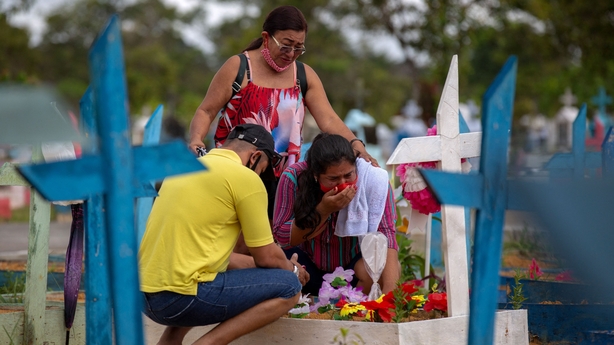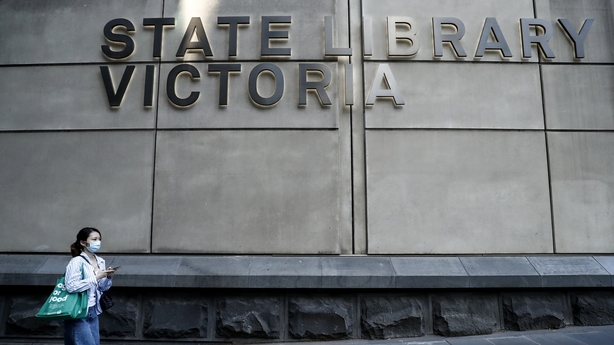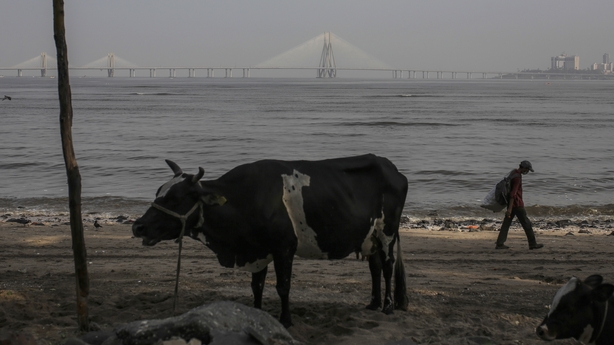Belgium will allow indoor drinking, dining and entertainment venues for audiences of up to 200 people to reopen from June 9, the country's prime minister said today.
Cafes and restaurants with outdoor seating reopened on Saturday after almost seven months, but theatres and cinemas have remained closed.
"We have taken giant steps forward," in the vaccination campaign, Prime Minister Alexander de Croo said, justifying the long-awaited easing.
By 9 June, Belgium expects to have vaccinated 80% of people over 65 and vulnerable people, he said.
It will be necessary to "keep the situation under control in the intensive care units" where the number of patients should not exceed 500, Mr De Croo added.
There are currently around 700 patients in intensive care, a figure that has been falling steadily for the past two weeks.
The measures also include loosening remote working rules by allowing one in five workers to return to the office in four weeks' time.
Rules around gatherings will be eased too, with four guests allowed inside people's homes instead of two.
In Belgium, total infections since the beginning of the pandemic recently broke one million cases.
But even though cases have dropped over the past weeks, there was still a daily average of 2,936 in the past seven days.
Vaccinations have accelerated in the country since the end of March, with over 3.5 million of the population of 11.5 million having received at least a first dose.
No mandatory vaccines for domestic workers in Hong Kong
Hong Kong today scrapped a plan to make coronavirus vaccines mandatory for foreign domestic workers after the proposal sparked an outcry and a diplomatic tussle.
But authorities ordered all foreign helpers to undergo another round of mandatory testing, triggering renewed criticism from the Philippines.
Health officials planned to roll out mandatory inoculations for the 370,000 domestic workers in the city, mostly poorly paid women from the Philippines and Indonesia.
Those wanting to apply for work visas - or renew their current ones - would need to show they had received two doses.
But today city leader Carrie Lam announced a U-turn.
"The government has decided not to request mandatory vaccination when helpers renew their contracts," she said, adding the decision had been made after meetings with officials from the Philippines and Indonesia.
Labour groups representing domestic workers said they felt they were being singled out, noting that the families they worked for - as well as locals working in environments such as care homes - were not required to get vaccinated.
So far just 16% of the city's 7.5 million people have received one or more doses, a long way from the 60-70% considered necessary for herd immunity.
Regular polling shows Hong Kongers have some of the lowest support ratings for inoculation in the world.
The vaccination drive has been hampered by the government's public trust deficit.
After huge democracy protests exploded in 2019, Hong Kong's unpopular unelected leaders - with the backing of Beijing - have overseen a sweeping crackdown on dissent in the city.

Brazilian states suspend AstraZeneca vaccine for pregnant women
Sao Paulo, Rio de Janeiro and other Brazilian states said they were suspending vaccination of pregnant women with the AstraZeneca coronavirus jab on the advice of the national health regulator, which cited an "adverse event."
The daily newspaper Folha de S.Paulo reported that the health ministry was investigating the death of a woman in Rio de Janeiro who had received the vaccine.
The ministry did not immediately confirm the report, but the Anvisa regulator mentioned an "adverse event" in a recommendation to halt AstraZeneca vaccines for pregnant women.
Slovakia halting use of AstraZeneca Covid vaccine for first doses
Slovakia's Health Ministry said today it was halting the use of AstraZeneca's Covid-19 vaccine for people getting their first doses.
The ministry said it would continue to use the shot for those waiting for the second dose and added it was considering various alternatives on how to proceed.
The decision comes after the state drug regulator last week reported the death of a 47-year-old woman that was likely connected to the shot.
Australia's Victoria on alert after first Covid-19 case in two months
Australia's second most populous state reported a locally acquired Covid-19 case for the first time in more than two months today, sending authorities scrambling to find the source of the infection amid concern about a new outbreak.
A man in his 30s, who returned from India in mid-April and completed mandatory two-week hotel quarantine in neighbouring South Australia, tested positive for the virus after developing symptoms over the weekend, authorities said.

Health workers had interviewed the man and urged people he had been in contact with to self-isolate and get tested. They also published a list of locations exposed to the virus.
Though Australia has largely eradicated the virus with border closures, Victoria has had most of the coronavirus cases and deaths and spent much of 2020 in lockdown.
"There is definitely a sense of complacency creeping in," Victoria Chief Health Officer Brett Sutton told reporters.
"We haven't had really significant outbreaks for some time and people drop their guard, people go about life as if we haven't been through the 15 months we have all been through. But it is a reminder that we need to be on guard."
Victoria had no immediate plans to elevate social distancing or mask-wearing rules, said Sutton, adding it was possible the man caught the virus in quarantine in Australia and not in India.
There were no other cases reported in Victoria or in New South Wales (NSW), Australia's most populous state, which tightened its virus-protection rules last week when a couple tested positive without a known source.
Australia has reported just over 29,900 novel coronavirus cases and 910 deaths since the pandemic began.
It closed its borders to all but citizens and permanent residents in March last year and international arrivals, except from New Zealand, spend two weeks in hotel quarantine at their own expense.
India doctors warn against cow dung as Covid cure
Doctors in India are warning against the practice of using cow dung in the belief it will ward off Covid-19, saying there is no scientific evidence for its effectiveness and that it risks spreading other diseases.
In the state of Gujarat in western India, some believers have been going to cow shelters once a week to cover their bodies in cow dung and urine in the hope it will boost their immunity against, or help them recover from, the coronavirus.

As participants wait for the dung and urine mixture on their bodies to dry, they hug or honour the cows at the shelter, and practice yoga to boost energy levels. The packs are then washed off with milk or buttermilk.
"Why not use the five by-products we get from our mother cow to get cured," said Gautam Manilal Borisa, an associate manager at a pharmaceuticals company, who said the practice helped him recover from Covid-19 last year.
In Hinduism, the cow is a sacred symbol of life and the earth, and for centuries Hindus have used cow dung to clean their homes and for prayer rituals, believing it has therapeutic and antiseptic properties.
Mr Borisa has been a regular at the Shree Swaminarayan Gurukul Vishwavidya Pratishthanam, a school run by Hindu monks that lies just across the road from the Indian headquarters of Zydus Cadila, which is developing its own Covid-19 vaccine.
Doctors and scientists in India and across the world have repeatedly warned against practising alternative treatments for Covid-19, saying they can lead to a false sense of security and complicate health problems.
"There is no concrete scientific evidence that cow dung or urine work to boost immunity against Covid-19, it is based entirely on belief," said Dr JA Jayalal, national president at the Indian Medical Association.
"There are also health risks involved in smearing or consuming these products - other diseases can spread from the animal to humans."
The coronavirus pandemic has wrought devastation on India, with 22.66 million cases and 246,116 deaths reported so far.
Experts say actual numbers could be five to 10 times higher, and citizens across the country are struggling to find hospital beds, oxygen, or medicines, leaving many to die for lack of treatment.

